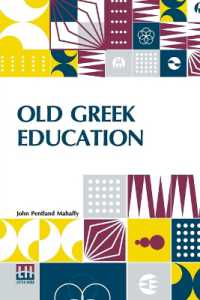- ホーム
- > 洋書
- > 英文書
- > Philosophy
Full Description
Providing a unique interpretation of Kant's theory of judgement as integral to his overall project, Claudia Brodsky explores his continued relevance to contemporary theoretical concerns. The Linguistic Condition traces how Kant combined sensus communis, or common sense with the communicative nature of judgement to reveal that, for him, acts of judgement are dependent on their linguistic articulation, so that in Kantian philosophy language and judgement are inextricably linked. In this first in-depth analysis of language in the Critique of Judgement, Brodsky forms creative connections between literature and philosophy.
Contents
Preface. Acting upon Condition
Chapter One. Introduction: Before Judgment: Doing without Knowing in Kant and Diderot
Part I. Linguistic Conditions
Chap. Two. "The Condition of Judgment:" Kant's "Common Sense," or the Origin of Language in the Third Critique
1. "'Common Sense'" and Signification, or What is Not Tautology
2. "Technique"
3. "Free"
4. "Feeling"
5. Speech Act and "Communicability"
6. Rousseau's Nouns
7. Diderot's Adjectives
8. Kant's Predicates: "Synthetic Judgments a Priori" and "A General Voice"
9. "The Schema," or Language Inside
10. What is Articulation?
11. World Without Words: Wordsworth
Part II. Missing Senses and Poetics Chap. Three. "Judgment" and the Genesis of What We Lack: "Poetry," "Schema,"
and the "Monogram of Imagination" in Kant
1. "Judgment" in the "Age of Critique"
2. Judgment and "Indifference:" The "Common Sense" of Imagination in Arendt
and Kant
3. The Schema and the Language of Poetry
4. Poetry and the Judgment of Critique
Chap. Four. Kleist's Mere Formalities 1. Kant and Kleist: Representation and Irony
2. What happened: Missed Representation and Misrepresentation
in "Die Marquise von O..."
3. Contesting "Judgment" in "The Duel"
Bibliography
Primary Bibliography
Secondary Bibliography








